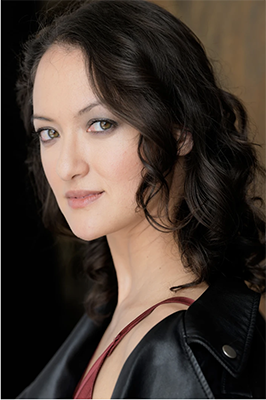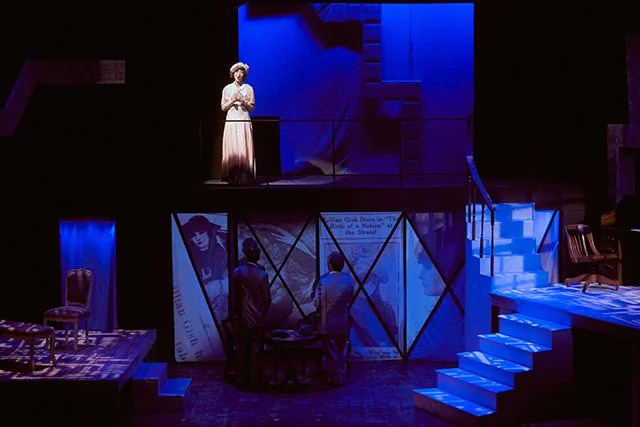Play Plunges Actor Alexandra Hellquist in Unresolved Debate
/Alexandra Hellquist (Photo by Paul Smith)
Griffith’s career could have been bookended with Birth of a Nation and Intolerance, the critically acclaimed yet epic flop of 1916. But in 1919, out of the depths of despair came his commercial triumph of the spirit, Broken Blossoms.
The metronome of scholarship to decide whether the Southerner’s place in cinema history is esteemed or contemptuous continues to swing, but Griffith’s ghost might have exulted in collegial vindication from Asian director Akira Kurosawa who placed Broken Blossoms at the top of his 100 favorite films.
Miss Burrows & Mr. Huan, Never the Twain Shall Meet
While Griffith was not so enlightened as to break with the custom of casting a Caucasian actor (Richard Barthelmess) to play a Chinese lead, Broken Blossoms was groundbreaking in its sensitive and heroic portrayal of its humble protagonist, Cheng Huan, in an interracial love story. If Birth of a Nation is condemned rightfully as a catalyst for the resurgence of the KKK in America 50 years after the Civil War, then Broken Blossoms must, for the sake of balance, be held up as candle of hope amid the Chinese Exclusion Acts that blot American history from 1882 to 1943.
Unbroken Blossoms, a play written by Philip W. Chung and directed by Jeff Liu, dramatizes the making of the film Broken Blossoms through the eyes of its two Chinese American consultants, James B. Leong (Gavin Kawin Lee) and Moon Kwan (Ron Song), who advised Griffith (Arye Gross) on the first United Artists movie set. The show runs from June 27th to July 21st at East West Players in Los Angeles.
Hellquist in Unbroken Blossoms
Into the maelstrom walked Alexandra Hellquist, a Chinoy-Caucasian actor, in the role of Lillian Gish (1893 to 1993), the first Lady of American Cinema and grande dame of the silent era with a firm voice for talkies and luscious blue eyes for the technicolor screen.
The initial assumption might be that a story with Griffith as a central character would have to be a repudiation of a brand of racism that was so harmful to society that he cannot be excused as a creature of his time.
“Phil presents Griffith as ahead of his time but does not let him off scot-free. The play opens with an acknowledgment of Birth of a Nation and how it defined and damaged his legacy. In this way, it sets up the scenes,” says Hellquist.
“(Nobody is denying) Griffith was a deeply flawed human. The story focuses on the difference between exploring someone’s flaws and vilifying him. By creating ambivalence, Phil and Jeff can lean into the rising discomfort and moral vertigo that makes for an interesting experience.” She warns, “You might pity Griffith more than you will loathe him.”
The East West Players production does disperse some belated redemption in recognizing Griffith for having Barhelmess inject humanity into a Chinese character who was inspired by a short story titled The Chink and the Child. “The character of Cheng Huan was portrayed as spiritual and relatively well grounded compared to other Asian portrayals of the period,” she notes.
Only an out of body experience might have rescued Griffith from the prejudices and squalor of his formative years in post-Reconstruction Kentucky. It’s revelatory that his past didn’t bleed him of all his humanity. Hellquist: “The story of Broken Blossoms is in many ways revolutionary in that it showed an Asian character sympathetically and as a romantic lead who was paired with a white girl.”
Alexandra Hellquist as Lillian Gish (top) and Gavin Kawin Lee as James B. Leong (bottom left) and Ron Song as Moon Kwan (bottom right) in Unbroken Blossoms at East West Players (Photo by Zev Rose Woolley)
That Is Now, This Was Then
In 2024, try to find an Asian comic without a white girlfriend on social media. The fledgling entertainment industry was more sheep than shepherd in society a century ago. To put the Asian-Caucasian relationship depicted in Broken Blossoms in historical context, anti-miscegenation laws criminalizing interracial marriage were in force in most U.S. states up until 1924.
In researching Gish in the role of Lucy Burrows in Unbroken Blossoms, Hellquist understands it was a good thing that Griffith didn’t cross every boundary that defined acceptable behavior leading up to the Great Depression. “He (Griffith) updated the character to be age fifteen or sixteen, which is more decent than the twelve years of age depicted in the short story before it was adapted into the movie,” Hellquist explains.
Confronted with an interracial April-December romance, censors could be lenient since the relationship was more tearful than physical. “It was very chaste with no sexuality whatsoever, which made it palatable to audiences at the time.” Nevertheless, Hellquist asks, “I wonder what their reaction would have been if he was allowed to kiss her even though it was a white man playing an Asian?”
Alexandra Hellquist as Lillian Gish in Unbroken Blossom at East West Players (Photo by Zev Rose Woolley)
Lillian Gish Wasn’t Just White and Neither Is Hellquist
Hellquist was born in Manila. After earning a degree in Comparative Literature from Brown University, she received theatrical training at T. Schreiber Studio and Theatre in New York City, where she lived for eight years.
Hellquist is the daughter of the late Jocelyn Lee, a Chinoy Filipina. Her father, Pieter Hellqvist, is Swedish-Danish; that is, as white as that BIC product from the typewriter age. This mixed-race daughter playing the role of Lillian Gish poses the question: Is an Asian actor playing a white actor? It depends on whom you ask.
“I’ve played white characters before because I pass as white more than I pass as Asian. I’d say I’ve played white characters in some theater companies that celebrate color because I seem less problematic. As an actor, I see the privileges and tragedies of passing as white.
One of Hellquist’s first features - Sole Proprietor, by Insurgent Pictures, Starring and Directed by Dan Eberle
“She (Gish) had a pristine reputation,” observes Hellquist. “She always played the good girl, the ingenue. She was among the white actors Griffith brought up from nothing. He could relate to Gish because he also had a poor childhood, and he was an actor before he became a director.”
For Hellquist, playing a character who is white is more familiar than playing one who is far right. In researching her role, Hellquist discovered that Gish belonged to the America First Committee that advocated an isolationist agenda that, among other demands, opposed the nation’s entrance into the Second World War. “I heard a speech on the web that I found unnerving. She (Gish) said we went to Italy, and you know Mussolini made the trains run on time.”
The next time the Metro, Gold Line, BART, Chicago L, the T, or F train is behind schedule, be thankful that America’s transportation systems aren’t evaluated by Fascist standards.
Nanay Dearest
When I write these profiles, I ask a question about how lovely it was to be raised in a Filipino household. Hellquist appeared to be a safe candidate since she is clearly a well-adjusted young woman of intelligence and compassion. She jarred me with a response that would insult the memory of her late mother if it were not true.
“My mother worked at McKinsey. Being this brilliant, petite Asian woman in a white boys’ club put her under immense pressure." She brought her troubles home. Just as fire purifies gold, Hellquist has gained resilience and empathy for anxieties and imperfections in others. She is thriving long after her mother found eternal peace at age 49.
The troubled mother left her daughter with lasting emotional scars. “I was a star pupil who earned admission into an Ivy League college,” she says in sotto voce as if meekness can strip a truthful statement of vanity.
The support of her family provides a constant layer of protection in all areas of her life. "Sometimes, I feel like I'm not good enough for my Filipino family."
The actor’s youth wasn’t entirely miserable. Her father in Italy, Pieter Hellqvist, became her refuge. “I call him my model of kindness and self-sacrifice.”
Hellquist in the short film "Le Director", as a temperamental, codependent French-speaking actress playing Cleopatra in the late 50s. The film is written & directed by Ze'ev Waisman and will be submitted to festivals this year (Photo by Jedidiah Woods).
A Mixture with Mixed Reviews
She sees the pitfalls and advantages of being what she calls “hapa” in its non-derogatory form. “I grew up all over the world. In Australia I was ostracized as this scrawny, ugly duckling. As a mestiza in the Philippines, I was getting modeling offers and was offered film roles. But I wasn’t good enough (as an actor) back then. Teenaged me didn’t know what I was doing.”
Despite the awkwardness of unsolicited adulation, she loves going back to the Philippines to see her family and reconnect with her heritage. “Filipinos have a bedrock culture of care that’s non-negotiable. As an actor, I can carry on the role of Filipina healer and builder of community through storytelling.”
Generosity Is Not Merely Its Own Reward
Hellquist is finding her bliss on stage and recently behind the curtains. In the middle of the actors and writers strikes of 2023, she produced Kill Shelter at Theatre of note in Los Angeles. The play featured a cast of veteran television actors and puppets. Kill Shelter took home the prestigious Production Award to go with awards in Direction that went to Shaina Rosenthal, Lead Performance to Ashley Romans, and Puppet Design Awards at the 54th Annual Los Angeles Drama Critics Circle Awards.
The production absorbed every gram of the selfless nature she inherited from her father. “My goal was to empower our artists as much as possible. We were working on a shoestring budget. I believe in treating our people as well as we can. Between crushing constraints, I really can say we did that.
“More and more, I’m stepping into creative spaces for myself and others instead of chasing approval and acceptance as I did in the past. This next phase of my creative career has me going to a place I love and share with others in love and safety.”
Phil presents Griffith as ahead of his time but does not let him off scot-free. The play opens with an acknowledgment of Birth of a Nation and how it defined and damaged his legacy.
But Can She Sing?
As a staff correspondent for Positively Filipino, I elicit quotations like the one above to end my articles, but each interview itself ends with the question: Can you sing?
The answer helps rate a person on the Filipino authenticity meter. Natural talent is no longer the ultimate factor. I revere equally the Pinoys, Pinays or Chinoys, who were born without the full combination of melodic gene and motivation to sing. If strong desire alone drives them to sing, it is possible to tip the needle up to 180 degrees.
Hellquist dared to revisit her past humiliation of “being a Filipina who’s singing in a karaoke bar in New York and sobbing the whole time.” After facing the limits of longing that only ballad-deprived Filipinas can feel, she drove to a vocal training studio in Atwater Village. Today, the verified, bona fide Fil-Am is proud to belt out, “I have a single on Spotify!”
Anthony Maddela is based in Los Angeles. As a writer, he has dipped his cursor in multiple genres. And he has multiple post-recurrence scans in July and August. He appreciates everyone’s prayers and good thoughts. He and Susan have Charlotte and Gregory as their adult children.
More articles from Anthony Maddela









